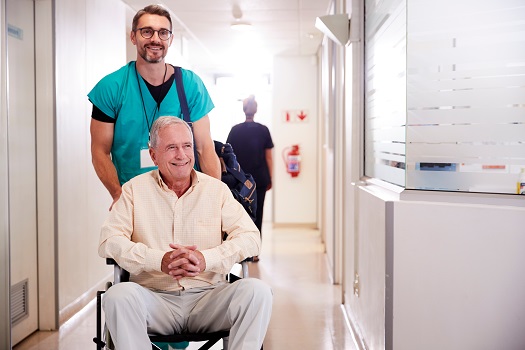Seniors are most vulnerable during the transition from hospital to home after surgery or illness. In fact, according to one study, 83 percent of older adults had problems during the first two days following hospital discharge. The good news is there are several steps you can take to reduce the stress and challenges of bringing a senior loved one home from the hospital.
Plan Ahead for the Transition
Caregivers can increase the chances of a successful transition home after a hospital stay by planning ahead as much as possible. You may want to make arrangements for any equipment you’ll need, such as assistive devices, disposable items, and oxygen supplies. Make any adjustments necessary to rooms in which these tools will be used. Many hospitals offer discharge planning resources to help caregivers and family members prepare as well as possible.
Professional caregivers can be a great boon to families who are unable to care for their loved ones on their own. If your elderly loved one is living with a serious medical condition and needs help managing the tasks of daily living, reach out to Home Care Assistance, a senior care agency you can trust. Our caregivers are available 24/7, there are no hidden fees in our contracts, and we offer a 100% satisfaction guarantee on all of our in-home care services.
Manage New Medications
Most seniors who are discharged from the hospital will have new medication routines. This means there’s a greater likelihood of medication errors. Taking incorrect dosages, missing doses, and mixing medications are common pitfalls that occur after leaving the hospital. Discuss any changes in medication with your loved one’s physician and the pharmacist. Dispose of any old medication, and make sure you understand which medications will interact negatively with one another.
If you or other family members are unable to handle caring for your loved one, hire a professional home caregiver. When researching agencies that provide at-home care, Barrie, ON, families are usually looking for flexible care plans, compassionate and highly trained caregivers, and 24/7 availability. Whether you need respite care to take a break from your caregiving duties or your senior loved one needs around-the-clock assistance at home, you can rely on Home Care Assistance.
Eliminate Trip Hazards
Every year, one out of every three seniors experiences a fall, and more than 1.6 million seniors are treated in emergency rooms for fall-related injuries. Seniors are especially vulnerable to falls after returning home from the hospital, as they may be recovering from surgery or illness that has left them weak or caused stability issues. Make your home as safe as possible by removing trip hazards, such as raised carpet edges, plants, tables, electrical cords, and furniture that blocks a clear walking path. Add nonslip mats and grab bars in the shower and bathtub as well.
Watch for Warning Signs
Many seniors experience problems after being discharged from the hospital. While every situation is unique, watch for signs your loved one is developing complications. This may include changes in balance or coordination, new skin problems, dizziness, diarrhea, fever, nausea, changes in behaviour, or complaints of pain.
Whether you need respite from your caregiving duties or your aging loved one needs live-in care, Barrie, ON, Home Care Assistance can meet your family’s care needs. Our dedicated caregivers are available around the clock to provide transportation to doctor’s appointments, ensure seniors take their prescribed medications, and help with a variety of tasks in and outside the home. Trust your loved one’s care to the professionals at Home Care Assistance. Reach out to one of our compassionate Care Managers today at 647-970-3803.
